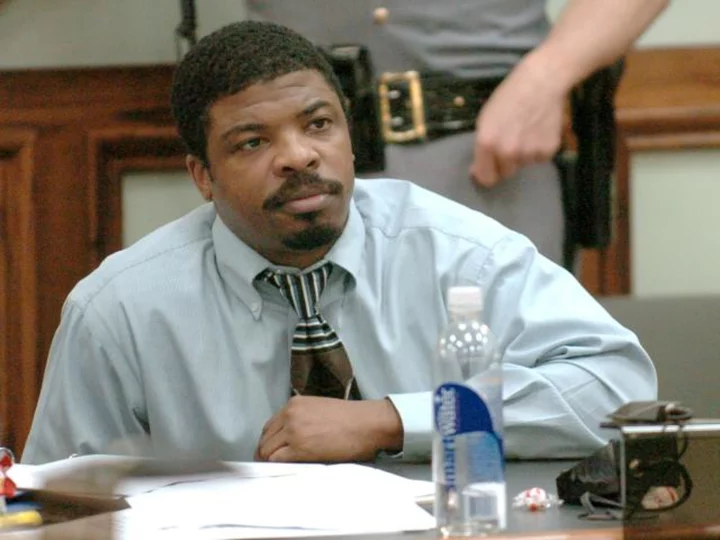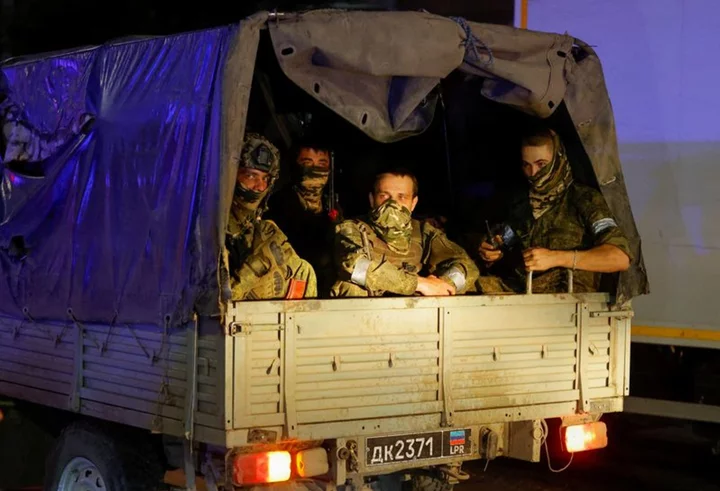Crooked cops. Drug dealers. Secret agendas.
The rumor mill churned after the body of 18-year-old Jessica Currin was found burned and decomposing behind Mayfield Middle School in 2000. People in the small Kentucky town still talk about the case -- or don't want to talk at all, if an outsider is asking the questions.
A jury deliberated for 3 hours and 45 minutes before convicting Quincy Omar Cross of murder, rape, sodomy, kidnapping, evidence tampering and abuse of a corpse in 2008 and sentenced him to life in prison. But Cross has always expressed his innocence, and Currin's father, Joe Currin, has come to believe Cross was wrongfully convicted. For over a decade, he has advocated for finding the person who, he says, really killed his daughter.
"We've just always (been) hoping that the truth would bring itself out," Joe Currin said. "But when you've got more people hiding the truth than you do trying to get to the truth, it's kind of hard to do."
Cross and his attorneys have tried to get his conviction overturned for years. In 2020, Miranda Hellman joined the Kentucky Innocence Project (KIP) and reignited the efforts. But the already convoluted case became more complicated when a tornado destroyed the Graves County courthouse in Mayfield, including documents and evidence being housed there.
KIP recently filed several motions in its effort to get Cross' conviction vacated, arguing it has new witnesses and evidence showing police and prosecutorial misconduct.
CNN will be following the team of the "Wrongful Conviction" podcast as it reports on KIP's efforts to overturn Cross' conviction. Over the next year, we will interview the central figures in the case, sometimes in conjunction with the podcast team and other times independently. CNN will also be doing its own reporting on Currin's murder.
CNN was present when "Wrongful Conviction" host Maggie Freleng interviewed Cross in June. This story was reported using that interview, along with several others conducted by CNN, the recent motions filed by KIP, court opinions from Cross' previous legal battles, and recordings of the original 2008 trial.
It's clear in this case that there are more than two sides to the story.
Saturday night
Currin was at a friend's house late on Saturday, July 29, 2000, playing cards with her 16-year-old cousin, Vinisha Stubblefield. Stubblefield testified at Cross' trial that when the gathering wrapped up, Currin left to walk home.
According to a court summary of her testimony, Stubblefield was in a car that night with Cross, Jeffrey Burton, Tamara Caldwell and Victoria Caldwell. They were all high on pills, cocaine and marijuana. They found Currin, and Currin accepted what she thought would be a ride home. But Cross started to make sexual advances. The group drove to Burton's house where Cross hit Currin and forced Currin into a back bedroom, Stubblefield said. She testified she later saw Currin unconscious on a bed, with Cross pulling on a belt around her neck. Stubblefield said Burton had sex with Currin, and Cross encouraged Stubblefield to do the same. Then the group, including the Caldwells, engaged in sexual activities with each other.
Victoria Caldwell also testified against Cross. Her version of events that Saturday night followed the same plot line but differed in several details. Caldwell said Cross hit Currin in the car with a bat and carried an unconscious Currin inside Burton's house. She said Currin regained consciousness in the bedroom and repeated the name of her infant son as she was raped. Caldwell said Cross then hit Currin in the head with a metal tool and strangled her with his black, braided belt.
Caldwell testified the group wrapped Currin's naked body in a blanket and hid it in Burton's garage. When the body started to smell, Burton, Stubblefield, Caldwell and a few others drove it to the middle school and lit it on fire.
Cross has a very different story about what happened that Saturday night. Cross told the "Wrongful Conviction" podcast he was in Union City, Tennessee, on July 29, when a couple of friends picked him up. The group drove around for a while, buying drugs, he said, before someone suggested they head over the Kentucky state line.
In Cross' telling, they arrived in Mayfield around 11 p.m. and eventually ended up at a gathering on Chris Drive, on the outskirts of the small town.
As Saturday night wore on, Cross borrowed a car and drove into Mayfield to grab something to eat. He told the podcast he got lost in the unfamiliar town and ran out of gas, found a gas can in the trunk and was filling up when Graves County Deputy Sheriff Mike Perkins stopped to help.
Perkins testified he smelled gasoline on Cross that morning, something the prosecution used to link Cross to the burning of Currin's body. Perkins also testified Cross kept pulling up his pants because he wasn't wearing a belt.
Perkins dropped Cross off at Chris Drive before returning to the car, where he saw marijuana seeds and a gun. He then returned to Chris Drive where he found Cross with "bags of powder and foil in his pockets," according to one of KIP's motions. Cross was arrested for drug possession early Sunday morning, July 30, along with several others at the party on Chris Drive and spent the next two years awaiting sentencing at the Kentucky Department of Corrections.
Cross says he was in jail the first time he ever heard Currin's name.
Before Cross' trial in 2008, Victoria Caldwell and Stubblefield pleaded guilty to evidence tampering and abuse of a corpse.
Burton and Tamara Caldwell, Victoria Caldwell's cousin, were charged alongside Cross but did not testify against him. After Cross' conviction, they entered Alford pleas to second-degree manslaughter and abuse of a corpse; Burton also pleaded the same to tampering with evidence. An Alford plea allows a defendant to maintain innocence while agreeing the prosecution has enough evidence to convict.
Both have maintained their innocence ever since.
Changing stories
The testimonies of Victoria Caldwell and Stubblefield were at the center of Cross' trial.
Cross' attorneys raised questions about the women's changing stories over the years. According to a judge's summary of her testimony, Caldwell admitted at Cross' trial that she lied to the police during their initial investigation, leading them to first charge Currin's boyfriend, Carlos "Lolo" Saxton, and Jeremy Adams, who is believed to be the father of Currin's child. (Saxton and Adams' charges were later dismissed without prejudice. More on that shortly.)
Stubblefield didn't mention Cross to investigators until five years after the murder, according to a motion filed by Cross' attorney, and instead implicated others in Mayfield.
Both Caldwell and Stubblefield said at trial they initially lied because they were afraid of Cross.
A new affidavit from Stubblefield is included in the motion to vacate Cross' conviction. In the statement, signed July 31, 2023, Stubblefield states she did not go to Jeffrey Burton's house that Saturday night; that she did not see Cross, Burton or Tamara Caldwell that night and did not help dispose of the body. She says she is innocent of the charges she was convicted of and made false statements because of pressure and threats from law enforcement.
Stubblefield recanting her testimony, however, is not new. Cross' latest petition in federal court was denied in August 2022; the court opinion states Stubblefield's statements don't clear Cross as she said she wasn't directly involved in the murder.
Stubblefield is currently serving time for drug possession, unrelated to the Currin case. CNN has reached out to her for comment.
The federal court also noted the back-and-forth on Victoria Caldwell's testimony; a Kentucky Innocence Project investigator reported Caldwell told him in 2012 that she made up her story to get money from the state. But Caldwell later refuted that conversation in an affidavit saying her original testimony was the truth.
The new motions filed by KIP this year include a transcription of an August 2023 telephone call between a KIP volunteer and Caldwell where she repeats the claim that the state coerced her into giving false testimony. Caldwell has not, however, signed a new affidavit to that effect.
CNN reached Caldwell via Facebook, where she agreed to answer a few questions. Caldwell said she doesn't remember a lot about the case but that she was forced to say what she did at trial. She would not say who forced her. "I didn't (want to) commit perjury but I also didn't (want to) die," she wrote.
At Cross' trial, investigators denied threatening witnesses or paying them for their testimony.
CNN reached out to the law enforcement agencies involved in the Currin case -- the Kentucky Attorney General's Office, Kentucky State Police (KSP) and Mayfield Police Department -- for comment. Mayfield Police Chief Nathan Kent referred CNN to KSP as the agency of record.
In their 2023 call, KIP also asked Caldwell about several diary entries that were presented at trial to back up Caldwell's testimony. During the trial, Caldwell read one excerpt, purportedly dated August 1, 2000, that said, "Damn they found the body. Man, I hope they don't find out it was us. F**k man Q is nowhere to be found. Jeff don't wanna talk to me. This is bullsh*t. F**k I am out."
In the transcript of her phone call with KIP that's included in the new court filings, Caldwell said the diary was forged at the direction of law enforcement. She has not made this claim under oath.
Hellman, Cross' attorney, has filed a motion to reexamine the ink on Caldwell's diary. At trial, the Secret Service's chief forensics chemist testified the ink Caldwell used could not be matched to any inks in their library that were commercially available in 2000. The chemist said that did not mean the entries were fake. But the defense suggested the lack of a match could mean Victoria wrote those diary entries long after the murder in 2000. Hellman says the ink may now be in the database, which could help accurately date the diary.
The citizen detective
Years before Cross' trial, in early 2001, Adams and Saxton were indicted on capital murder charges in the Currin case. But less than a week before Adams' scheduled trial date in February 2003, the state's case fell apart.
Adams' attorney accused the Mayfield Police Department of not handing over critical evidence. The judge dismissed the case without prejudice, meaning Adams could be charged again if prosecutors wanted to retry. Charges against Saxton were also dropped. Both asserted their innocence.
Mayfield resident Susan Galbreath, a friend of Adams' mother, set out to solve Currin's murder. A self-described "middle aged, cigarette smoking busy body wino" with no investigative experience herself, Galbreath reached out to BBC reporter Tom Mangold for help. Mangold flew to Mayfield in 2004 and the unlikely pair started digging.
Mangold later wrote he and Galbreath decided after two weeks Cross had "probably" killed Currin "in a sex-and-drug-fuelled attack." In 2004, three years before Cross was charged, Mangold published a story detailing their time in Mayfield and implicating Cross in the crime.
Pages of newly discovered emails between Mangold and Galbreath are a part of KIP's motion to vacate Cross' conviction. Cross' attorney argues the emails show Galbreath and Mangold were looking to sell the story of Currin's murder. The motion also alleges police and prosecutorial misconduct, saying Galbreath was "essentially deputized" by the Kentucky State Police and Kentucky Bureau of Investigation to join their investigations; that Galbreath and police freely exchanged information; and that Galbreath's belief in Cross' guilt influenced the state's case.
Galbreath testified she was the one who first put Victoria Caldwell in contact with the Kentucky Bureau of Investigation after they joined the investigation in 2006. She also conducted interviews with Cross and Adams. At trial, the lead investigator for the Kentucky State Police testified Galbreath was allowed in several interviews to encourage witnesses to cooperate with them.
Before Cross' trial, the Kentucky Bureau of Investigation presented Galbreath with an "Outstanding Citizen Award" for her role in the Currin case.
CNN has reached out to the Kentucky Attorney General's Office and Kentucky State Police for comment. The Kentucky Bureau of Investigation is no longer in operation.
Galbreath died in 2018 at the age of 58.
When CNN reached out to Mangold, he wrote, "If your project is any attempt or reference to the fact that Quincy Coss [sic] and all the others who were convicted of Jessie's murder might be innocent then I want nothing to do with it. If it's anything else, I'd be pleased to help." After CNN confirmed we would be fairly and accurately representing both sides of the story, Mangold politely declined to participate.
A charred crime scene
The state of Currin's body made gathering physical evidence difficult -- there was little at the crime scene that wasn't burned. Currin's mother identified her from the jewelry she was wearing Saturday night.
A short piece of braided belt with a buckle attached was found close to the body -- a piece of evidence the medical examiner used to determine Currin died by strangulation, though the body had none of the usual signs. Currin's body also displayed no physical signs of rape due to the burning.
No forensic evidence was presented at trial linking Cross to the murder.
Cross is now waging several legal fights in an attempt to get his conviction overturned. Last year, a federal court denied a petition challenging his state court conviction. Cross is asking the court to revisit that judgment due to what his attorney describes as "new evidence that calls into question the integrity of his conviction." The warden's response is expected in October.
In state court, Cross's attorney has moved to vacate the conviction on similar grounds. She's also filed two motions seeking the release of certain evidence for re-examination and testing. In addition to examining the diary ink, she is requesting DNA testing of several items from the middle school that were not previously tested or were tested with the limited science available at the time. If the motion is granted, KIP plans to have hairs found on and around Currin's body tested, as well as cigarette butts found at the scene and DNA from the belt buckle. They said they would also test a plastic Gatorade bottle that is believed to have carried the accelerant used to set Currin's body on fire.
The Kentucky Attorney General's Office has until December to respond to the state court motions. CNN plans to cover the next hearing in January 2024.









